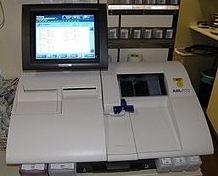OK, time to start pimping some Irish EM research. There’s a fair amount of it and some of it is really useful. I distantly know some of the folk involved but alas have no part in producing any of it!
This is a paper (out of St James’ Hospital, Dublin) that adds to the growing body of info that says ABGs have limited utility. A lot of EDs in Ireland have blood gas analysers in their resus rooms and it’s not uncommon for a venous gas to be drawn when the cannula is places at triage.
METHODS
- effectively a convenience sample of COPD pts with exacerbations
- got paired ABG and VBG (<5mins between samples)
- a raised CO2 was considered >45mmHg on the VBG
RESULTS
- n = 90 or so
- age 70 or so
- none were intubated
- a third had raised arterial pCO2; 20% were acidotic
- perfect agreement on the question “is the patient hypercarbic?” when a cut off of >45mmHg was used on the VBG
- there were wide variations (average diff between ABG and VBG was 8.6mm) but even with this it still told you what you wanted to know
- pH and bicarb were very tightly correlated
SUMMARY
- in other words if the VBG has a high CO2 you need to do an ABG to find out exactly what it is, But if the venous CO2 is <45 then happy days.
REFERENCE
- McCanny P, Bennett K, Staunton P, McMahon G. Venous vs arterial blood gases in the assessment of patients presenting with an exacerbation of chronic obstructive pulmonary disease. Am J Emerg Med. 2012Jul.;30(6):896–900. PMID 21908141


Great article, echoes what was found in:
1. Ann Thorac Med. 2011 Jan;6(1):33-7.
Comparison and agreement between venous and arterial gas analysis in cardiopulmonary patients in Kashmir valley of the Indian subcontinent.
Koul PA, Khan UH, Wani AA, Eachkoti R, Jan RA, Shah S, Masoodi Z, Qadri SM, Ahmad M, Ahmad A.
The full text is free and demonstrates comparable venous and arterial pH’s and pCO2’s
Thanks Andy for sparing the pain, and expense of unnecessary arterial punctures.
Cheers for the paper Rob.
Absolutely Andy. We have been a huge advocate of VBGs for years. in fact it’s one of my favourite Med Ed memories……….years ago a junior doc (who is now a consultant) came to our ED when I was a reg. I suggested that VBGs were great and a replacement for ABGs in most circumstances (we were discussing a patient with DKA). She was unconvinced, argued the case for ABGs and I felt that I’d not got the message across.
About three months later I overheard her teaching the med students on the value and utility of VBGs over ABGs…….result 🙂 She remains one of the best clinicians I ever trained, but the memory is that of truly knowing that education has worked when you see someone else teaching what you have taught. One of my proudest days as an educator to be honest.
Anyway, BBs have been advocating this for ages….but the message is still not out there, I still see patients managed on VBGs, only for them to get an arterial stab following hand over. I’m thinking DKA here Mr RMO!!!!
…..and let’s not forget CBGs as well.
http://www.bestbets.org/bets/bet.php?id=472
http://www.bestbets.org/bets/bet.php?id=1660
http://www.bestbets.org/bets/bet.php?id=459
http://www.bestbets.org/bets/bet.php?id=233
S
Cheers for the links Simon. The message is most certainly not out there, especially among receiving consultant teams. I imagine most of the actual consultants aren’t that bothered but their juniors certainly seem to be.